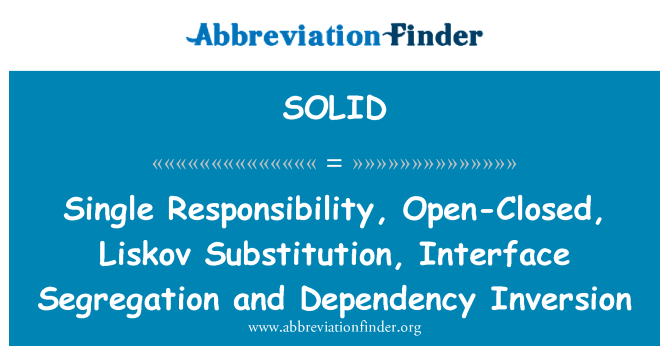Home › 5 Letters › SOLID › Single Responsibility, Open-Closed, Liskov Substitution, Interface Segregation and Dependency Inversion
SOLID: Single Responsibility, Open-Closed, Liskov Substitution, Interface Segregation and Dependency Inversion
What does SOLID mean? Single Responsibility, Open-Closed, Liskov Substitution, Interface Segregation and Dependency Inversion is one of its meanings. You can download the image below to print or share it with your friends through Twitter, Facebook, Google or Pinterest. If you are a webmaster or blogger, feel free to post the image on your website. The SOLID may have other definitions. Please scroll down to see its definitions in English, and other five meanings in your language.
SOLID stands for Single Responsibility, Open-Closed, Liskov Substitution, Interface Segregation and Dependency Inversion
The following image presents one of the definitions of SOLID in English language. You can download the image file in PNG format for offline use or send image of SOLID definition to your friends by email.

Regarding the image for acronym of SOLID, the dimensions of 669 pixels (length) by 350 pixels (width) provide a clear and adequately detailed visual representation, while the 60 kilobytes size ensures that the image is lightweight enough for quick loading and easy handling across various digital platforms.
-
Quotation of "SOLID - Single Responsibility, Open-Closed, Liskov Substitution, Interface Segregation and Dependency Inversion " as a Guest Visitor
If you find the information provided on this page both useful and intriguing, we encourage you to share it with others. Feel free to spread the word by posting it on your preferred social media platforms to help others discover and understand the diverse meanings of SOLID.
-
Quotation of "SOLID - Single Responsibility, Open-Closed, Liskov Substitution, Interface Segregation and Dependency Inversion " as a Website Manger
You can cite the acronym of SOLID by employing either the MLA (Modern Language Association) or APA (American Psychological Association) citation styles. By including the acronym in your bibliography in this manner, you will provide your visitors with a well-rounded view of its various interpretations and ensure that the source of this information is properly credited.
Other Meanings of SOLID
As mentioned above, the SOLID has other meanings. Please know that five of other meanings are listed below. You can click links on the left to see detailed information of each definition, including definitions in English and your local language.
Definition in English: Single Responsibility, Open-Closed, Liskov Substitution, Interface Segregation and Dependency Inversion
Please be informed that some of our acronyms and their definitions are created by our visitors. Therefore, your suggestion of new acronyms is highly welcome! As a return, we have translated the acronym of SOLID to Spanish, French, Chinese, Portuguese, Russian, etc. You can further scroll down and click the language menu to find meanings of SOLID in other 42 languages.
SOLID as an English Acronym
In English, SOLID stands for Single Responsibility, Open-Closed, Liskov Substitution, Interface Segregation and Dependency Inversion . In your local language, SOLID stands for Single Responsibility, Open-Closed, Liskov Substitution, Interface Segregation and Dependency Inversion. Below are advantages and disadvantages of using this acronym.
-
SOLID => Single Responsibility, Open-Closed, Liskov Substitution, Interface Segregation and Dependency Inversion
Utilizing SOLID as an abbreviation enhances communication by providing a concise and efficient method, ultimately conserving time and space. This practice also conveys a sense of professionalism and specialization in particular fields. Employing the Single Responsibility, Open-Closed, Liskov Substitution, Interface Segregation and Dependency Inversion abbreviation serves as a mnemonic device and ensures uniformity in official documents.
-
SOLID => Single Responsibility, Open-Closed, Liskov Substitution, Interface Segregation and Dependency Inversion
Due to the various interpretations of SOLID, this acronym can cause ambiguity and confusion, especially among audiences unfamiliar with its meanings. Additionally, frequent use of Single Responsibility, Open-Closed, Liskov Substitution, Interface Segregation and Dependency Inversion may foster a sense of exclusivity, possibly alienating individuals not familiar with the terminology. Overusing such acronyms can ultimately diminish overall clarity.








